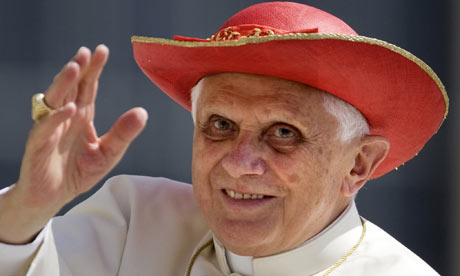• Global recession caused by greed, says pontiff Pope Benedict. Photograph: Chris Helgren/Reuters Pope Benedict today pinned responsibility for the worldwide recession squarely on greed and an amoral fascination with technological progress for its own sake. This must be tackled, he said, by the creation of a global political authority and financial order based not just on the search for ever greater profits, but on ethics and a sense of the common good. The pontiff made the appeal in a 144-page encyclical – a reflection on doctrine that is the highest form of papal writing – three days before he was due to discuss the global downturn with Barack Obama. Caritas in Veritate (Charity in Truth) is Benedict's third encyclical and the first to deal exclusively with economic and social issues. In one section, he says the current economic crisis is "clear proof" of the "pernicious effects of sin". The pope's analysis echoed some of the criticisms made by the archbishop of Canterbury, Rowan Williams, of government policies that target growth to the exclusion of wider social considerations. But, as its title suggests, the papal encyclical is a primarily theological discourse which takes as its point of departure the argument that only a belief in the truth as proclaimed by Christianity can offer the necessary answers. "A Christianity of charity without truth would be more or less interchangeable with a pool of good sentiments," Benedict writes. His reflection – delayed by more than a year by the world economic crisis – nevertheless contains numerous specific criticisms and recommendations. Though the pontiff does not use the word "capitalism" in the encyclical, there are lengthy reflections on morality in economics. In a key passage, the encyclical says: "The conviction that the economy must be autonomous, that it must be shielded from 'influences' of a moral character, has led man to abuse the economic process in a thoroughly destructive way. In the long term, these convictions have led to economic, social and political systems that trample upon personal and social freedom, and are therefore unable to deliver the justice that they promise." Then in an unequivocal critique of unbridled markets, the pope writes that "grave imbalances are produced when economic action, conceived merely as an engine for wealth creation, is detached from political action, conceived as a means for pursuing justice through redistribution." At a press conference in the Vatican, the pope's technical consultant, Stefano Zamagni, an economics professor at the University of Bologna, denied the encyclical was anti-capitalist, but added that it "views capitalism in its historical dimension and goes beyond it". He noted that "the market economy is broader than just capitalism", which was merely one variant. In another section of the reflection, Benedict argues that "financiers must rediscover the genuinely ethical foundation of their activity … right intention, transparency, and the search for positive results are mutually compatible and must never be detached from one another." Then, in a passage that builds on ideas first voiced by his predecessor, John Paul II, the pope argues that globalisation has made necessary a "reform of the United Nations Organisation and likewise of economic institutions and international finance so that the concept of the family of nations can acquire real teeth". One of his most senior advisers, cardinal Renato Martino, said: "The encyclical is not asking for a super- or world government." But it comes very close to doing so. It proposes a "true world political authority" that "would need to be universally recognised and to be vested with the effective power to ensure security for all, regard for justice and respect for rights." It would be asked to "manage the global economy; to revive economies hit by the crisis [and] to avoid any deterioration of the present crisis." But its responsibilities would be more than just economic. They would include securing "timely disarmament, food security and peace". The new body, a reformed UN, would also be called upon "to guarantee the protection of the environment and to regulate migration". Often regarded as the first "green" pope, Benedict also took advantage of his encyclical to make clearer his ideas on the importance of respecting the environment. But Zamagni said the document implicitly rejected forms of environmental thinking that put other forms of creation on a par with humankind.From profits to ethics: pope calls for a new political and financial world order
• Economic crisis is 'clear proof of effects of sin'
Thursday, 9 July 2009
Posted by
Britannia Radio
at
09:51
![]()





















